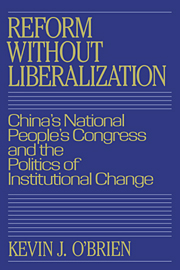 Reform without Liberalization
Reform without Liberalization 3 - Development, doubts, and decline
Published online by Cambridge University Press: 22 March 2010
Summary
The 1954 constitution and the NPC organic law established the NPC and granted it an array of powers that paralleled those of the Supreme Soviet and East European assemblies. The constitution deemed the NPC “the only legislative authority in the country,” “the highest organ of state authority,” and the sole body empowered to amend the constitution. As the only legally sovereign organ and a conduit for mass political participation, the NPC legalized Communist rule and represented popular sovereignty within the Chinese constitutional myth. It stood beside the vanguard party and symbolized accountability and a united political community. A working model of democratic centralism, the NPC embodied socialist democracy and boosted party legitimacy. Its primary task was mobilizing citizens and offering them a chance to participate in governing an exclusive, class-based Leninist state in the form of a dictatorship of the proletariat.
As the nation's law maker, the NPC shared the right to initiate legislation with the state chairman, vice chairman, and the highest state executive organ – the State Council. The State Council was given the power to issue decrees and orders that did not contravene the constitution or laws passed by the NPC, but the NPC had the power to revise or annul decisions of any state organ that it judged to be in conflict with the constitution.
The NPC was also empowered to form and oversee the upper reaches of the state apparatus.
- Type
- Chapter
- Information
- Reform without LiberalizationChina's National People's Congress and the Politics of Institutional Change, pp. 29 - 60Publisher: Cambridge University PressPrint publication year: 1990


